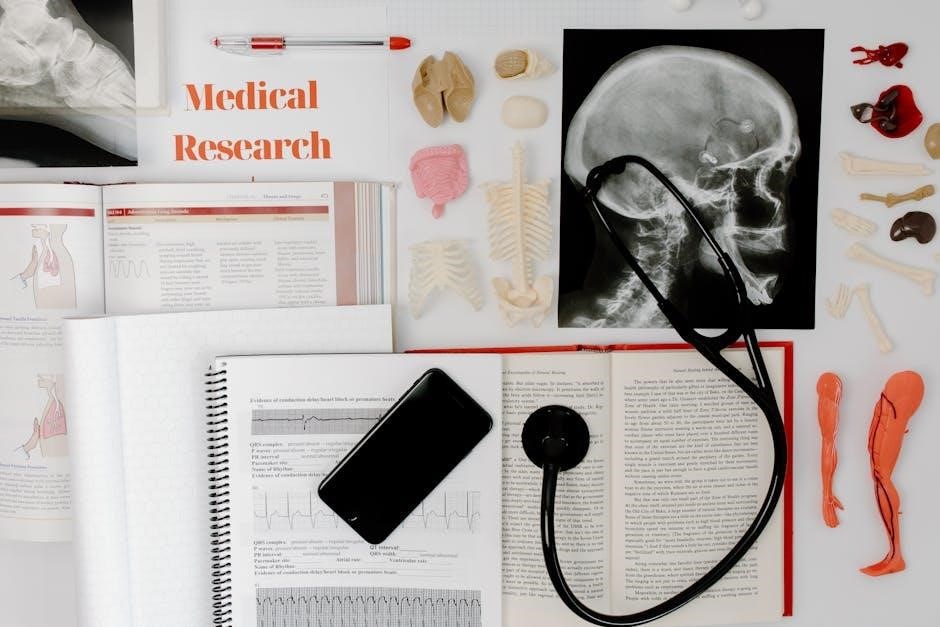The AQA A Level Biology Textbook PDF provides comprehensive coverage of the curriculum‚ focusing on practical skills‚ theoretical concepts‚ and independent learning support through detailed visual aids.
1.1 Overview of the AQA A Level Biology Curriculum
The AQA A Level Biology curriculum is designed to develop a deep understanding of biological concepts‚ practical skills‚ and independent learning. It is divided into two years‚ covering topics such as cells‚ genetics‚ ecosystems‚ and human physiology. The curriculum emphasizes experimental design‚ data analysis‚ and scientific communication. Students also explore the ethical implications of biological advancements. This comprehensive approach prepares learners for university studies and careers in science‚ fostering critical thinking and problem-solving abilities. The curriculum aligns with the AQA textbook‚ ensuring thorough exam preparation and skill development.
1.2 Importance of Using the AQA Textbook for A Level Biology
The AQA A Level Biology textbook is essential for mastering the curriculum‚ offering structured content aligned with exam requirements. It provides detailed explanations‚ diagrams‚ and practice questions‚ enhancing understanding and exam readiness. The PDF format allows easy access and portability‚ enabling students to study anytime‚ anywhere. Additionally‚ the textbook supports practical skills development and independent research‚ such as EPQ projects‚ while revision guides and online resources complement its use‚ ensuring comprehensive preparation for A Level Biology exams and beyond.
1.3 Benefits of Accessing the Textbook in PDF Format
Accessing the AQA A Level Biology textbook in PDF format offers numerous advantages‚ including portability and convenience. Students can easily download and access the material on various devices‚ facilitating study on-the-go. The PDF format ensures that content remains consistent and searchable‚ with clickable links and bookmarks for efficient navigation. This digital accessibility supports active learning techniques‚ such as highlighting and note-taking‚ while also reducing the need for physical storage. Additionally‚ the PDF format allows for easy sharing and collaboration among students and educators‚ enhancing collective learning experiences.
Structure of the AQA A Level Biology Textbook
The AQA A Level Biology Textbook is organized into two years‚ covering essential biological concepts‚ practical skills‚ and revision resources to support comprehensive learning and exam preparation.
2;1 Year 1 Biology Content
Year 1 of the AQA A Level Biology Textbook covers foundational topics such as cell structure‚ transport systems‚ infection‚ immunity‚ inheritance‚ and variation. It emphasizes practical skills‚ including microscopy and dissection‚ while introducing statistical analysis; The content aligns with the AQA curriculum‚ ensuring a solid understanding of biological principles. Revision guides and practice questions are integrated to support exam preparation‚ making it a comprehensive resource for first-year students.
2.2 Year 2 Biology Content
Year 2 of the AQA A Level Biology Textbook delves into advanced topics like molecular biology‚ genetics‚ biotechnology‚ ecosystems‚ and conservation. It explores human impacts on the environment‚ emphasizing ethical considerations. Practical skills are further developed through complex investigations‚ and data analysis techniques are refined. The content prepares students for the challenges of A Level exams‚ fostering deeper critical thinking and application of scientific principles to real-world scenarios. Revision guides and past papers enhance exam readiness.
2.3 Practical Skills and Investigations
The AQA A Level Biology Textbook PDF emphasizes the development of practical skills through detailed investigations and experimental designs. Students learn to plan and conduct experiments‚ analyze data‚ and interpret results. The textbook includes guidance on laboratory techniques‚ safety protocols‚ and ethical considerations. Practical exercises align with exam requirements‚ ensuring students are well-prepared for assessments. Resources such as practice question cards and past papers further enhance understanding and application of scientific methods in real-world contexts.
Key Topics Covered in the Textbook
The AQA A Level Biology Textbook PDF covers essential topics like cells‚ genetics‚ biotechnology‚ ecosystems‚ and human physiology‚ integrating practical skills with theoretical knowledge for comprehensive understanding.
3.1 Cells‚ Tissues‚ and Organisms
The textbook explores cell structure‚ transport‚ and division‚ emphasizing their role in forming tissues and organs. It covers epithelial‚ connective‚ and muscle tissues‚ explaining how they contribute to organ systems. The PDF also delves into immune responses‚ detailing how cells and tissues interact to maintain organism health. Practical investigations‚ such as microscopy and dissection‚ are included to reinforce understanding of cellular and tissue organization in diverse organisms.
3.2 Transport Systems in Humans
The textbook thoroughly examines human transport systems‚ focusing on blood circulation‚ lymphatic function‚ and gas exchange. It details the roles of arteries‚ veins‚ and capillaries‚ alongside the heart’s structure and blood pressure regulation. The PDF also covers oxygen and carbon dioxide transport via hemoglobin‚ emphasizing efficient gas exchange in the lungs. Practical investigations‚ such as measuring blood pressure‚ are included to deepen understanding of these critical transport mechanisms in maintaining human physiology.
3.3 Nutrition‚ Blood‚ and Gas Exchange
The textbook explores how nutrition‚ blood circulation‚ and gas exchange are interconnected in human physiology. It explains the absorption and transport of nutrients‚ highlighting the role of the digestive system and blood components like plasma and red blood cells. Gas exchange is detailed‚ emphasizing alveoli function and hemoglobin’s role in oxygen transport. Practical investigations‚ such as measuring blood glucose levels‚ are included to illustrate these processes‚ providing a comprehensive understanding of how the body sustains life through these systems.
3.4 Nervous and Hormonal Control
This section delves into the dual control systems of the body‚ exploring the nervous system’s rapid signaling through neurons and synapses and the endocrine system’s slower‚ hormone-mediated responses. It discusses the hypothalamus and pituitary gland’s roles in regulating hormones‚ as well as the pancreas’s function in blood glucose control. Practical investigations‚ such as nerve conduction experiments‚ are included to reinforce understanding of these interconnected systems that maintain homeostasis and respond to stimuli.
Year 1 Biological Concepts
This section covers essential Year 1 topics‚ including cell structure‚ transport mechanisms‚ tissue organization‚ and immune responses. It also introduces inheritance and genetic variation‚ providing a solid foundation for advanced study with practical and theoretical insights.
4.1 Cell Structure and Transport
Cell structure and transport are fundamental concepts in A Level Biology. The textbook explores cell membranes‚ cytoplasm‚ and organelles like the nucleus‚ mitochondria‚ and ribosomes. Transport mechanisms‚ including passive transport (diffusion‚ osmosis) and active transport‚ are detailed with examples. These processes are essential for cell survival and function‚ forming the basis for understanding more complex biological systems and metabolic processes later in the curriculum. Clear diagrams and examples help students grasp these key biological principles effectively.
4.2 Organization of Cells into Tissues
The AQA textbook explains how cells specialize and organize into tissues‚ forming functional units. Epithelial‚ connective‚ muscle‚ and nervous tissues are explored in detail. These tissues work together to maintain bodily functions‚ such as protection‚ support‚ movement‚ and communication. The textbook uses visual aids and case studies to illustrate how tissue organization underpins health and disease‚ providing a solid foundation for understanding complex biological systems and their interactions. This section is crucial for grasping higher-level concepts in physiology and pathology.
4.3 Infection and Immunity
The AQA textbook delves into the mechanisms of infection and the body’s immune response. It covers physical barriers‚ innate immunity‚ and adaptive immunity‚ emphasizing how the immune system distinguishes self from non-self. Pathogens like bacteria‚ viruses‚ and fungi are discussed‚ along with the role of antibodies and vaccines. Practical examples and diagrams illustrate immune system functions‚ providing a clear understanding of how the body combats diseases and maintains health. This section is vital for understanding immune-related disorders and modern medical interventions.
4.4 Inheritance and Variation
The AQA textbook explores how genetic information is inherited and how variation arises. It discusses DNA structure‚ replication‚ and gene expression‚ linking these to traits and biodiversity. Mendelian and modern genetics are covered‚ explaining inheritance patterns and genetic crosses. The role of mutation‚ genetic recombination‚ and environmental factors in creating variation is emphasized. Practical examples‚ such as pedigree analysis and Punnett squares‚ illustrate genetic principles‚ while modern techniques like gene editing highlight the dynamic nature of inheritance and variation in biology.

Year 2 Biological Concepts
Year 2 explores advanced topics like molecular biology‚ genetic engineering‚ and ecosystems‚ supported by practical skills and resources such as CGP guides and online platforms for comprehensive learning.
5.1 Molecular Biology and Genetics
The section dives into molecular biology‚ focusing on DNA replication‚ transcription‚ and translation processes. It explores genetic engineering techniques‚ including CRISPR and PCR‚ and their applications in biotechnology. Students learn about gene expression regulation and the ethical implications of genetic modifications. Practical activities‚ such as DNA extraction and gel electrophoresis‚ reinforce theoretical concepts. Case studies on genetic disorders and gene therapy provide real-world context‚ aligning with exam requirements and fostering deeper understanding.
5.2 Biotechnology and Gene Engineering
This chapter explores biotechnology applications‚ emphasizing gene engineering and its ethical considerations. It covers techniques like CRISPR‚ cloning‚ and recombinant DNA technology‚ with case studies on agricultural and medical advancements. Practical skills include designing experiments and analyzing data from genetic studies. The section also addresses environmental impacts and regulatory issues‚ preparing students for critical thinking and problem-solving in real-world biotechnological scenarios.
5.3 Ecosystems and Conservation
This section delves into the principles of ecosystems‚ focusing on energy flows‚ nutrient cycles‚ and biodiversity. It explores conservation strategies‚ habitat restoration‚ and the impact of human activities on ecosystems. Students learn to analyze ecological data and evaluate conservation methods. Practical skills include monitoring biodiversity and assessing ecological restoration efforts. The chapter also addresses global challenges‚ such as climate change and deforestation‚ emphasizing sustainable practices and ethical considerations in environmental management.
5.4 Human Influences on the Environment
This chapter examines the profound impact of human activities on ecosystems‚ including pollution‚ climate change‚ and resource depletion. It discusses how anthropogenic activities disrupt natural processes‚ leading to biodiversity loss and environmental degradation. The section highlights the importance of sustainable practices and ethical considerations in mitigating these effects. Case studies and practical activities help students understand the consequences of human behavior on ecosystems and explore solutions for conservation and environmental stewardship.
Practical Skills Development
This section focuses on developing essential laboratory and investigative skills‚ including experimental design‚ data collection‚ and analysis. Resources like investigation guides and practice cards enhance practical understanding‚ preparing students for exams and assessments.
6.1 Experimental Design and Investigation
The AQA textbook provides detailed guidance on experimental design‚ emphasizing critical thinking and scientific practices. Resources like investigation guides and practice cards offer structured support‚ enabling students to plan‚ conduct‚ and analyze biological investigations effectively. These tools enhance understanding of experimental methodologies‚ ensuring students master practical skills required for A Level assessments and beyond. The focus is on fostering independence and accuracy in scientific inquiry‚ preparing learners for real-world applications of biological research.
6.2 Data Collection and Analysis
The AQA textbook equips students with robust tools for data collection and analysis‚ fostering accurate interpretation of biological investigations. Detailed guides on graph interpretation‚ statistical methods‚ and error analysis are included‚ ensuring students can present and evaluate data effectively. Practical examples and exercises reinforce these skills‚ preparing learners for laboratory assessments and encouraging critical thinking in scientific contexts. Mastering these techniques is essential for precise and meaningful biological research‚ aligning with A Level standards and beyond.
6.3 Scientific Writing and Reporting
The AQA textbook emphasizes the importance of clear and precise scientific writing‚ providing structured templates and examples to guide students. It covers essential elements of scientific reporting‚ including abstracts‚ methods‚ results‚ and discussions. Practical exercises help students refine their ability to communicate complex biological concepts effectively. Emphasis is placed on clarity‚ accuracy‚ and adherence to scientific conventions‚ ensuring students are well-prepared for laboratory reports and assessments. This skill is vital for conveying research findings confidently and professionally.
Revision Resources and Guides
The textbook offers essential revision materials‚ including concise summaries‚ practice questions‚ and past papers‚ to help students reinforce their understanding and prepare effectively for exams.
7.1 Revision Guides for Year 1 Biology
Year 1 revision guides are tailored to cover foundational topics‚ such as cell biology‚ transport systems‚ and infection immunity. These guides include concise notes‚ diagrams‚ and practice questions to help students consolidate their knowledge. Additionally‚ CGP revision guides are recommended for their clear explanations and structured approach‚ making complex concepts easier to grasp. Regular use of these resources ensures students are well-prepared for assessments and build a strong foundation for Year 2 studies.
7.2 Revision Guides for Year 2 Biology
Year 2 revision guides focus on advanced topics such as molecular biology‚ genetics‚ and ecosystems. They provide detailed explanations‚ practice questions‚ and past paper exercises to reinforce understanding. CGP revision guides are particularly popular for their clarity and structured approach‚ covering key areas like biotechnology and conservation biology. These resources also include tips for tackling high-weightage exam questions and effectively managing time during assessments‚ ensuring students are fully prepared for their final exams.
7.3 Practice Questions and Past Papers
Practice questions and past papers are essential for exam preparation. They provide real exam scenarios‚ helping students familiarize themselves with question formats and timing. Past papers from previous years allow students to identify recurring themes and high-weightage topics. Additionally‚ prac-q-cards and online resources offer interactive ways to test knowledge. Regular practice with these materials ensures students can apply their understanding effectively and build confidence in tackling complex questions under timed conditions.
Effective Study Tips for A Level Biology
Develop a structured study schedule‚ engage in active learning techniques‚ and use flashcards for memorization. These strategies enhance retention and help manage study time effectively.
8.1 Creating a Study Schedule
Creating a study schedule is essential for A Level Biology success. Allocate specific time slots for each topic‚ balancing theory and practical work. Prioritize challenging areas and incorporate regular breaks to maintain focus. Use digital calendars or planners to stay organized and track progress. Consistency is key to mastering complex concepts and ensuring thorough preparation for exams. Regular reviews of the schedule help adapt to changing needs and maintain momentum throughout the academic year.
8.2 Active Learning Techniques
Active learning techniques enhance engagement and understanding in A Level Biology. Conduct investigations‚ participate in group discussions‚ and use interactive tools like flashcards. Summarizing complex concepts in your own words strengthens retention. Engage in practical activities to apply theoretical knowledge‚ fostering critical thinking and problem-solving skills. Regularly test yourself and teach concepts to others to reinforce learning. These methods ensure a deeper grasp of biological principles and prepare you effectively for exams and independent study.
8.3 Using Flashcards and Summarization
Flashcards are an effective tool for memorizing key terms and concepts in A Level Biology. Write definitions or explanations on one side and questions or terms on the other. Regularly testing yourself with flashcards improves retention; Summarization involves condensing complex topics into concise notes‚ enhancing understanding and recall; Use the AQA textbook PDF to create flashcards and summaries‚ focusing on diagrams‚ equations‚ and critical biological processes. These methods help streamline revision and reinforce learning efficiently.

Role of the AQA Textbook in Exam Preparation
The AQA textbook is crucial for exam preparation‚ offering structured content‚ practice exercises‚ and insights into exam formats‚ helping students focus on high-weightage topics and build confidence.
9.1 Understanding Exam Format and Structure
The AQA textbook provides clear insights into the exam format‚ detailing question types‚ time management‚ and marking schemes. It helps students familiarize themselves with the structure‚ ensuring they understand what to expect. By reviewing past papers and practice questions‚ learners can adapt their strategies to tackle various sections effectively. This preparation boosts confidence and improves performance in the actual exams.
9.2 Focusing on High-Weightage Topics
The AQA textbook identifies and emphasizes high-weightage topics‚ ensuring students prioritize areas like molecular biology‚ genetics‚ and ecosystems. By aligning study efforts with exam question trends‚ learners can maximize their scores. The textbook’s structured approach helps students focus on key concepts‚ enabling efficient revision and better time management during exams. This strategic focus ensures learners are well-prepared for the most frequently assessed topics‚ enhancing their overall performance.
9.3 Practicing with Textbook Exercises
Practicing with textbook exercises is crucial for exam success. The AQA Biology textbook includes practice questions‚ past papers‚ and practical investigation guides‚ allowing students to apply theoretical knowledge. Regular practice helps reinforce concepts‚ improve problem-solving skills‚ and familiarize students with exam formats. By completing exercises‚ learners can identify weaknesses‚ refine their techniques‚ and build confidence. This structured approach ensures thorough preparation and enhances performance in both written and practical assessments.

Additional Resources for A Level Biology
Supplement your studies with CGP revision guides‚ online learning platforms‚ and Science and Technology Committee publications for enhanced understanding and exam preparation in A Level Biology.
10.1 Online Learning Platforms
Online learning platforms offer a wealth of resources for A Level Biology‚ including interactive tutorials‚ video lectures‚ and practice quizzes. These platforms often provide access to past papers‚ revision guides‚ and study tips tailored to the AQA curriculum. Many platforms also feature forums where students can discuss topics‚ share resources‚ and seek advice from peers and educators. Utilizing these tools can enhance understanding‚ improve exam preparation‚ and foster a collaborative learning environment for students studying A Level Biology.
10.2 CGP A Level Biology Revision Guides
CGP A Level Biology Revision Guides are comprehensive resources designed to support students in their exam preparation. These guides are structured into modules‚ covering both Year 1 and Year 2 content‚ and include concise notes‚ practice questions‚ and revision tips. They complement the AQA textbook by focusing on high-weightage topics and offering clear explanations. Available in print and digital formats‚ CGP guides are widely used by students and teachers for their clarity and effectiveness in reinforcing key concepts and exam techniques.
10.3 Science and Technology Committee Publications
Science and Technology Committee Publications provide valuable resources for A Level Biology students‚ offering insights into emerging scientific topics and technologies. These publications often include detailed inquiries and research findings‚ which can enhance students’ understanding of complex biological concepts. They serve as supplementary materials to the AQA textbook‚ offering real-world applications and case studies that align with the curriculum. These resources are particularly useful for students conducting independent research or preparing for exams‚ as they provide additional perspectives on key topics.

EPQ and Independent Research
The AQA Biology Textbook PDF supports students in developing independent research skills‚ ideal for EPQ projects. It provides detailed content‚ fostering analytical thinking and deep topic exploration.
11.1 Developing Independent Thinking Skills
The AQA Biology Textbook PDF encourages students to develop independent thinking through structured content that promotes critical analysis‚ problem-solving‚ and self-directed learning. It includes activities designed to enhance research abilities‚ fostering a deeper understanding of biological concepts. These skills are essential for EPQ projects‚ where students must explore topics in depth and present their findings coherently; The textbook’s comprehensive resources and practical examples guide students in cultivating these valuable academic skills effectively.
11.2 Choosing a Biology-Related EPQ Topic
Selecting a biology-related EPQ topic requires alignment with the AQA curriculum and personal interest. Students should choose topics that allow original research‚ such as emerging biological technologies or ecological studies. The AQA textbook provides inspiration through its detailed content‚ covering molecular biology‚ genetics‚ and conservation. Consulting with teachers and using textbook resources ensures a well-focused and feasible project. A strong topic selection is crucial for a successful EPQ‚ showcasing independent thinking and research skills effectively.
11.3 Conducting Research for EPQ
Conducting research for an EPQ in biology involves planning‚ organization‚ and critical thinking. Students should utilize credible sources‚ including academic journals and the AQA textbook‚ to gather relevant data. Practical investigations‚ such as lab experiments or fieldwork‚ can enhance the project’s depth. Effective time management and regular consultations with advisors ensure progress. The research process fosters independent learning and analytical skills‚ essential for achieving a high-quality EPQ that showcases originality and scientific understanding.
The AQA A Level Biology Textbook PDF is an essential resource for students‚ offering comprehensive curriculum coverage‚ practical skills‚ and support for independent learning and exam success.
12.1 Recap of Key Features of the AQA Textbook
The AQA A Level Biology Textbook PDF offers comprehensive curriculum coverage‚ practical skill development‚ and robust revision resources. It includes detailed visual aids‚ clear explanations‚ and structured revision guides. The textbook supports independent learning with EPQ guidance and practical exam tips. Additionally‚ it provides access to practice questions‚ past papers‚ and flashcards for effective study. These features make it an invaluable resource for achieving success in A Level Biology.
12.2 Final Tips for Acing A Level Biology
To excel in A Level Biology‚ focus on understanding core concepts and applying them to practical scenarios. Regularly review notes‚ use flashcards for key terms‚ and practice past papers. Develop a study schedule and stay organized. Engage in active learning by teaching concepts to others. Seek clarification on doubts promptly and utilize online resources for additional support. Stay motivated‚ manage exam stress‚ and approach each question methodically. Consistent effort and strategic revision will ensure success.
